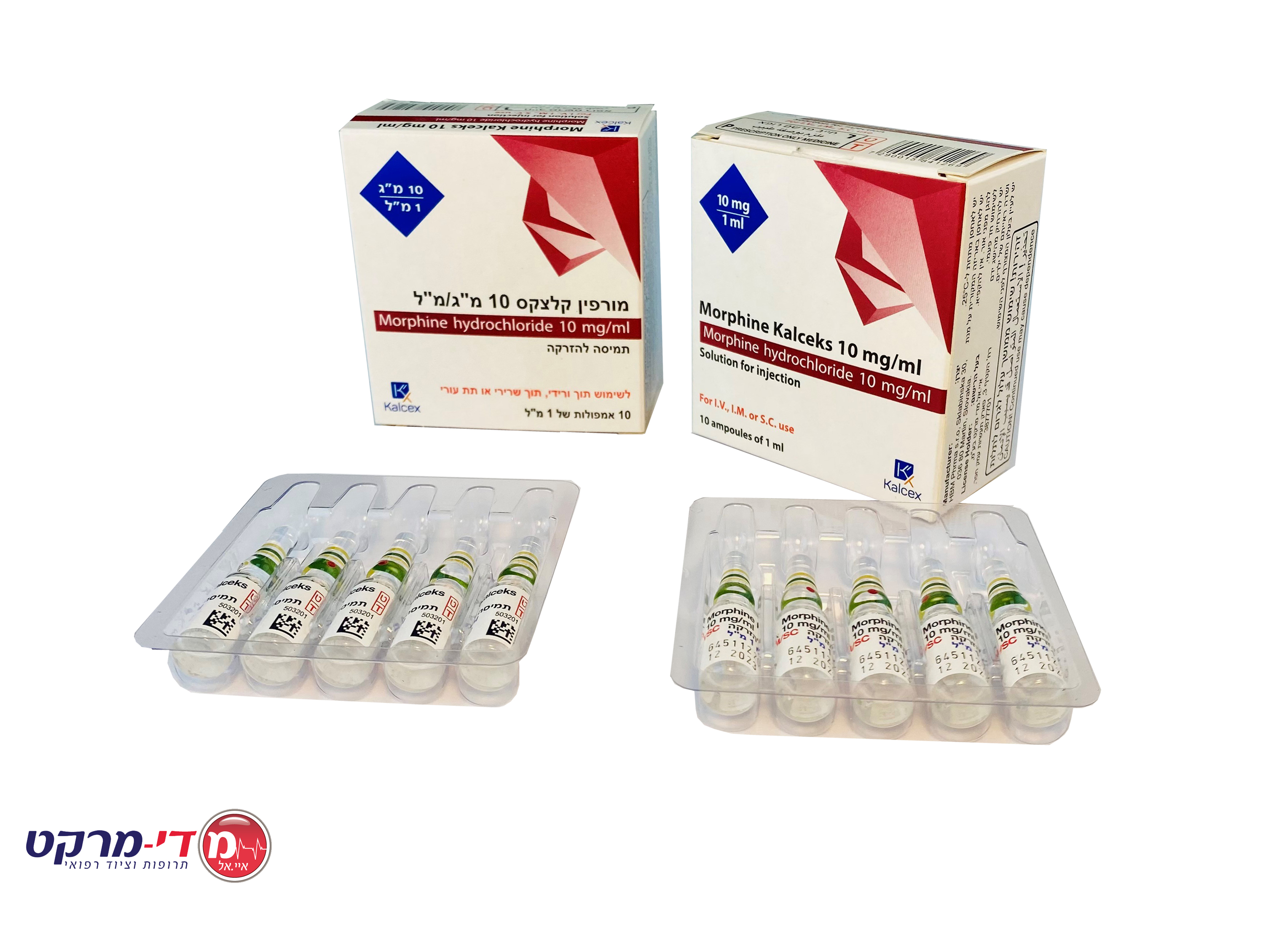Quest for the right Drug

מורפין קלצקס 10 מ"ג/מ"ל MORPHINE KALCEKS 10 MG/ML (MORPHINE HYDROCHLORIDE)
תרופה במרשם
תרופה בסל
נרקוטיקה
ציטוטוקסיקה
צורת מתן:
תת-עורי, תוך-שרירי, תוך-ורידי : S.C, I.M, I.V
צורת מינון:
תמיסה להזרקה : SOLUTION FOR INJECTION
עלון לרופא
מינוניםPosology התוויות
Indications תופעות לוואי
Adverse reactions התוויות נגד
Contraindications אינטראקציות
Interactions מינון יתר
Overdose הריון/הנקה
Pregnancy & Lactation אוכלוסיות מיוחדות
Special populations תכונות פרמקולוגיות
Pharmacological properties מידע רוקחי
Pharmaceutical particulars אזהרת שימוש
Special Warning עלון לרופא
Physicians Leaflet
Adverse reactions : תופעות לוואי
4.8 Undesirable effects The most serious hazard of therapy is respiratory depression (see section 4.9). The commonest side- effects of morphine are: • Nausea • Vomiting • Constipation • Drowsiness • Dizziness Tolerance generally develops with long term use, but not to constipation. Other side effects include the following: Psychiatric disorders • Dependence. Immune system disorders: • Anaphylactic reactions following intravenous injection have been reported rarely, anaphylactoid reactions. Cardiac disorders: • Bradycardia • Palpitations • Tachycardia • Orthostatic hypotension. Nervous system disorders: • Myoclonus • Mental clouding • Confusion (with large doses) • Hallucinations • Headache • Vertigo • Mood changes including dysphoria • Euphoria • Allodynia • Hyperalgesia (see section 4.4) • Hyperhidrosis Gastrointestinal disorders: • Dry mouth • Biliary spasm • Pancreatitis Eye disorders: • Blurred or double vision or other changes in vision • Miosis Reproductive system and breast disorders: • Long term use may lead to a reversible decrease in libido or potency. • Central sleep apnoea syndrome Skin and subcutaneous tissue disorders: • Pruritus • Urticaria • Rash • Sweating. • Contact dermatitis has been reported and pain and irritation may occur on injection. • Facial flushing • Acute generalised exanthematous pustulosis (AGEP) Musculoskeletal and connective tissue disorders • Muscle rigidity Hepatobiliary disorders • Spasm of sphincter of Oddi Renal and urinary disorders: • Difficulty with micturition • Ureteric spasm • Urinary retention • Antidiuretic effect. General disorders and administration site conditions: • Drug withdrawal (abstinence) syndrome Tolerance develops to the effects of opioids on the bladder. The euphoric activity of morphine has led to its abuse and physical and psychological dependence may occur (see section 4.4). Description of selected adverse reactions Drug dependence and withdrawal (abstinence) syndrome. Use of opioid analgesics may be associated with the development of physical and/or psychological dependence or tolerance. An abstinence syndrome may be precipitated when opioid administration is suddenly discontinued, or opioid antagonists administered or can sometimes be experienced between doses. For management, see 4.4. Repeated use of Morphine Kalceks can lead to drug dependence, even at therapeutic doses. The risk of drug dependence may vary depending on a patient's individual risk factors, dosage, and duration of opioid treatment (see section 4.4) . Physiological withdrawal symptoms include Body aches, tremors, restless legs syndrome, diarrhoea, abdominal colic, nausea, flu-like symptoms, tachycardia and mydriasis. Psychological symptoms include dysphoric mood, anxiety and irritability. In drug dependence, “drug craving” is often involved. Reporting of suspected adverse reactions Reporting suspected adverse reactions after authorisation of the medicinal product is important. It allows continued monitoring of the benefit/risk balance of the medicinal product. Any suspected adverse events should be reported to the Ministry of Health according to the National Regulation by using an online form https://sideeffects.health.gov.il

שימוש לפי פנקס קופ''ח כללית 1994
לא צוין
תאריך הכללה מקורי בסל
לא צוין
הגבלות
לא צוין
מידע נוסף
